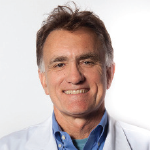Q: What is most challenging about your work?
A: As rheumatologists, we find ourselves with other specialists in an environment where deductive reasoning, making the right diagnosis, spending time with the patients while acknowledged as being important are not compensated for in a fee-for-service world driven by procedures and other ways of getting reimbursed. That puts rheumatologists at the lower end of the reimbursement spectrum. I think this has contributed to our declining workforce numbers, especially as projected.
Q: What does the College mean to you?
A: The ACR is my intellectual home. It is an organization that I trust. The agenda is the correct agenda. It is really about the field, supporting rheumatologists. It is a consistent, clean organization. It is managed extremely well. It’s a modern organization. I think it is a model medical society, and I’m delighted to be part of it.
Q: What does this award, from your peers, mean to you?
A: I’m very honored. … It’s an unexpected award for me, because I feel that the work that I’ve done is really the work of several people over the years. I think it really represents the ACR’s own success with the registry. This is an award to the entire effort that was put together to create the largest registry of rheumatic diseases in the world.
ACR Distinguished Clinician Scholar
 W. Winn Chatham, MD
W. Winn Chatham, MD
Clinical Director, Division of Clinical Immunology & Rheumatology, University of Alabama at Birmingham (UAB) School of Medicine, Birmingham, Ala.
Background: During a three-year tour with the National Health Services Corps in the mid-1980s, Dr. Chatham managed a very complex lupus patient while working as a general internist. Lupus has been his career focus since he went straight from the Corps to a rheumatology fellowship at UAB.
“I have had the good fortune of spending most of my career at an institution where one can seamlessly integrate the missions of research, teaching, and patient care,” he says. “Working for 10 years in a basic science laboratory trying to better understand the biology of neutrophils in joint and vascular inflammation provided a nice context for appreciating and applying all of the new scientific breakthroughs and the ever-increasing number of therapies at our disposal to help our patients.”
And help he has.
Dr. Chatham developed a Lupus Clinic at UAB that exposes patients to clinical trials for new therapies. His research has made progress in explaining the biology and clinical applications of TNF family receptors and their ligands.



